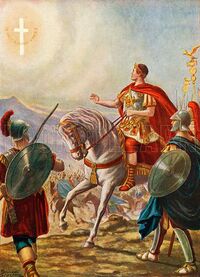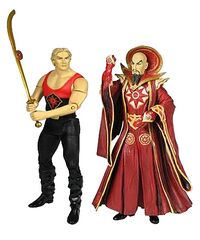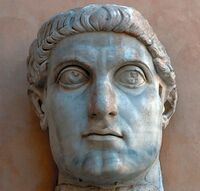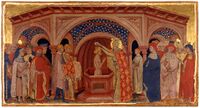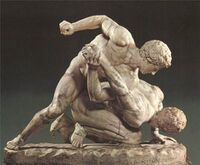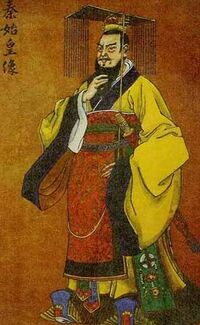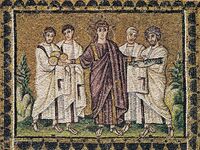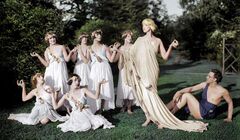4th century
Jump to navigation
Jump to search
| ||||||||||||||||||||
This page is a member of the Uncyclopedia Timeline. If an event isn't listed in the timeline, it most likely happened.
Represented here are the time periods from 301 to 400.
Constantine the Great did three things in his life: He became emperor and survived, gave Christianity the green light to flourish and moved the official capital of the Roman Empire to Constantinople. After he showered and waxed.
The 4th century is for at least Christians the time they could emerge from out of the catacombs or under rocks to became officially tolerated. Admittedly, things were a bit dicey in the beginning of the century. Emperor Diocletian had decided that these Christian fellows were mucking up his lovely empire and deserved a severe persecution.
Chronology[edit]
301 to 310[edit]
- 301 – Armenia officially becomes a Christian kingdom. Suck that Rome!
- 302 – Pope_Marcellinus makes holiday plans for an extensive tour. Bags are packed, tickets bought and slaves hired to carry gifts. Marcellinus forgets to send gifts/bribes to the Roman Emperors to make it a smooth journey.
- 303 – Roman Emperor Diocletian receives no Christmas presents this year. Angry at the snub, he orders the suppression of Christianity and the execution of their leaders. Diocletian starts with Santa Claus and his devils-in-imp-form (reindeer) and crucifies them.
- 303 – Deaths of St. Sebastian (arrows), St. Catherine (burning wheel) and St. George (to Danerys, Mother of all Dragons) in defence of the Christian religion.
- 305 – Diocletian abdicates as emperor. Retires to a fortified palace to grow his own grub. Considered to be the first ecologically-friendly ruler. Persecution of Christians is carried on by his successors.
- 306 – Constantine proclaimed emperor in York. He had been there on a family visit to see his father Emperor Constantius I. Amongst the new emperor's supporters are a group of Heavy Metal Helvetican fans of King Krokus.
- 306 – King Krokus suddenly croaks.
- 309 – Emperor Ming of Jin declares war on Flash of Gordon.
311 to 320[edit]
- 312 – Constantine kills rival Emperor Maxentius in a battle. Constantine claims he saw a dirty great crucifix in the sky before the action started with the face of hairy bloke with long hair.
- 313 – The Edict of Milan for the official toleration of Christianity also includes a codex banning toenail clipping in public. A fashion show followed.
- 314 – Pope Sylvester I successfully lobbies Emperor Constantine for planning permission to build a basilica to St. Peter on top of his supposed tomb on the Vatican Hill. Sylvester is successful but turns into a cat.
- 314 – The Christian Council of Arles brands another fellow group of worshippers as heretics in what is called the 'Donatist dispute'. It requests Emperor Constantine to throw the legal book at them. Christianity has been barely legal for a year and is already using the state to squash rivals.
- 315 – Future religious trouble maker Arius spreads his message that Jesus and God maintain separate bank accounts and are different people. His method of delivery is via sea shanties like What Shall We Do With a Drunken Bishop and the Good Ship Venus.
- 317 – First tea room opens in China. Cucumber sandwiches follow in about 14 centuries.
- 320 – The Gupta Empire replaces the Patel Empire in India.
- 320 – Christmas Day declared to be Jesus's official birthday. Families make a last minute effort to make sure plenty of geese are cooked and booze is got in for the celebration.
321 to 330[edit]
- 322 – The Chinese invent the horse stirrup. This simple but effective idea to keep a still on a gee-gee takes at four centuries to catch on in Europe where falling off your horse is a major source of belly laughs for peasants.
- 324 – Emperor Constantine wins a short war against his imperial colleague/rival and brother-in-law Licinius. The Roman Empire reunited. Licinius abdicates and takes up gardening. Constantine changes his mind and executes Licinius. He hates people who garden.
- 325 – The First Council of Nicaea formulate a doctrine to describe Jesus's relationship with God. Jesus is a bad son as he never remembers his dad's birthday.
- 326 – Constantine's mother St. Helena travels to the Holy Land on a all-holy-relics-included package tour. Her wonky astrolabe leads her to a windswept island in the South Atlantic.
- 326 – Empress Fausta is boiled alive in her sauna when her husband has the door bolted from the outside.
- 330 – Emperor Constantine digs the first clod of earth to symbolise the construction of his new capital city of 'New Rome' on the site of an old Greek city called Byzantium. His slaves carry on with the rest of the building work. The city is later known as Las Vegas.
331 to 340[edit]
- 337 – Death of Constantine the Great. He has a death bed conversion to Christianity and is later made a saint. His past sins forgiven as he was a 'pagan' before. These include executing his son and murdering his wife.
- 337 – The Imperial Roman cake is cut originally into many slices by Constantine's family. This is followed by a furious row and a blood letting fury which kills everyone except Constantine II, Constantius II and Constans I. This leads to peace until 340.
- 340 – Constantine II is killed in a bungled invasion of Italy to spite his brother Constans. Cue more family mayhem.
341 to 350[edit]
- 343 – Emperor Constans I comes to Britain for a spot of war against the Picts and some sexual adventures with assorted civilised and uncivilised Celts.
- 343 – A new church council in Serdica to 'reconcile Nicenes and Arians' ends in the usual theological fisticuffs. The Arians lose again but convene their own council to counter the religious decisions made at Serdica and declare the 'other lot' as traitors to Christ.
- 345 – Zen and the Art of War Chariot Maintenance published in China.
- 347 – Birth of Jerome K. Jerome. He wrote Three Men in a Galley before turning to Christianity and changing his name to simply 'St. Jerome' in anticipation of a future sanctity (he was right).
351 to 360[edit]
- 351 – Constantius's re-unites the Roman Empire under his rule. Contemporaries say he reminded people of his father Constantine I but without the thigh-slapping humour associated with his famous dad.
- 354 – The birth of St. Augustine. He is disappointed that his mother Monica required sex with her husband to produce him.
- 358 – Chinese Buddhist tourist Faxian goes to India to write his best seller A Record of Buddhist Kingdoms, Being an Account by the Chinese Monk Fa-Xian of his Travels in India and Ceylon in Search of the Buddhist Books of Discipline. Also known as Faxian's Faffing About. or Chastisement for Beginners.
361 to 370[edit]
- 363 – Death of Emperor Julian the Apostate. He is killed by an arrow fired by Jesus.
- 365 – An earthquake in Crete swamps Alexandria with a tide of ancient Greek crap.
- 366 – Rival groups elect two popes to slug it out. In one corner is Pope Ursinus ('The Bear') and Pope Damasus ('The Damsel'). They stir up mobs to attack each others supporters. Many are killed in the name of Jesus. Damasus wins out in the end and declares his rival an antipope, heretic and follow of Arianism ('hiss-boo'!).
- 367 – Bishop St. Athanasius publishes a list of books he considers are biblical canon. Excluded are the Chronicles of Riddick, Book of The Hobbit, Gospel According to John Lennon and anything written by Dan Brown
- 370 – The Huns make their first historical entrance into Europe by breaking up a rave party of Ostrogoths and Visigoths in what is now the Ukraine. Clothes are ripped, make-up badly smeared.
371 to 380[edit]
- 371 – The discovery of Pope Damasus's old love letters to a woman called Projecta produce an entertaining magic lantern by his political/religious enemies.
- 375 – Emperor Valentinian I suddenly drops dead at a party. Since he was a good Catholic boy, his demise is put down to high blood pressure.
- 376 – Caravans of Goths cross the Danube looking to escape from the 'beastly Huns'. They are placed in detention camps by the Romans 'pending deportation'.
- 378 – Battle of Adrianople. The Visigoths leave their calling card by killing Roman Emperor Valens.
381 to 390[edit]
- 381 – The First Council of Constantinople performs a systematic religious upgrade on the earlier First Council of Nicaea. An error message comes back suggesting this church has been hacked by Satan.
- 382 – Pope Damasus accused of being a 'ladies Holy Man' for his passion of conduction personal religious services for wealthy female clients.
- 383 – Western Roman Emperor Gratian is overthrown and killed by rival Magnus Maximus in one of the last chariot road rage incidents recorded.
- 384 – Book of Steps recommends listening to Brit Pop group Steps for spiritual nourishment. See er...chapter..hmmm.
- 385 – Emperor Theodosius I bans people reading the entrails of animals to predict future events. They are told only God knows what will happen so pray instead.
- 389 – Bishop Ambrose of Milan invents the 'antiphonal' religious chant. This is a call and response way of singing in church to the sound of a drum bass and tambourines.
391 to 400[edit]
- 391 – Paganism officially banned in the Roman Empire (West and East). The persecuted become the persecutors. All the fun in the old polythestic world is sucked out by religious fanatics disguised as bishops and popes.
- 393 – Emperor Theodosius bans the Olympic Games after he failed to win a gold medal in hypocrisy.
- 394 – Closure of the Temple of Vesta in Rome. The Vestal Virgins are dispersed and told to get out there and find themselves a good Christian soldier.
- 394 – Theodosius is the undisputed emperor of the entire Roman Empire. Unity restored at last, a new golden age with Theodosius until..
- 395 – ...he dies. Roman Empire split between his sons Honorius and Arcadius. Never shall the twain meet again.
- 396 – St. Augustine becomes Bishop of Hippo Regius after rejecting similar offers from Crocodile Dundee and Kangaroo Island.
- 397 – Publication of Confessions in Thirteen Books, Four Scrolls and a Box of Used Tissues by St. Augustine. It's a steamy bedtime read about sexual incontinence, lust and plenty of booze. The book's title is later condensed to just Confessions.

